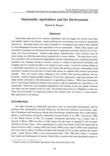Sustainable Agriculture and the Environment
JIRCAS international symposium series
| ISSN | 13406108 |
|---|---|
| 書誌レコードID(総合目録DB) | AA1100908X |

本文フルテキスト
intlsymp-6_73-82.pdf346.72 KB
Sustainable agriculture will continue indefinitely and will supply the world's food, fiber and esthetic needs of its citizens. Issues involving the environment are central to sustainable agriculture. Recorded history has many examples of civilizations and nations that suffered or even disappeared because their agriculture was not sustainable. Today, many aquatic and terrestrial ecosystems are showing stress because of agriculture practices that are not in harmony with the environment. Erosion, salinization, desertification, water pollution and climate change are affecting agricultural productivity in many nations. The agricultural practices identified with environmental degradation include overgrazing, poor irrigation practices, excessive row cropping leading to erosion, overuse or misuse of agricultural chemicals, and bringing land into production that is too fragile to grow crops. Corrective actions leading to a sustainable agriculture are necessary soon before the growing and more demanding world population requires food and fiber at levels that cannot be supplied with current agricultural systems. This will require major changes in the world's food growing patterns and approaches. Needed changes include research to find more appropriate crops and practices and using holistic principles in the development of agricultural systems. While free trade promises to raise living standards, benefits must accrue to all the population for agriculture to be sustainable. Otherwise, environmental degradation will continue as the poor gather firewood and water and use unstable lands for food. Developed nations have an obligation. to help stabilize the environment by supporting policies and research that will lead to a more sustainable agriculture in all nations.
| 作成者 | Dennis R. Keeney |
|---|---|
| 公開者 | Japan International Research Center for Agricultural Sciences |
| オンライン掲載日 | |
| 号 | 6 |
| 開始ページ | 73 |
| 終了ページ | 82 |
| 言語 | eng |
